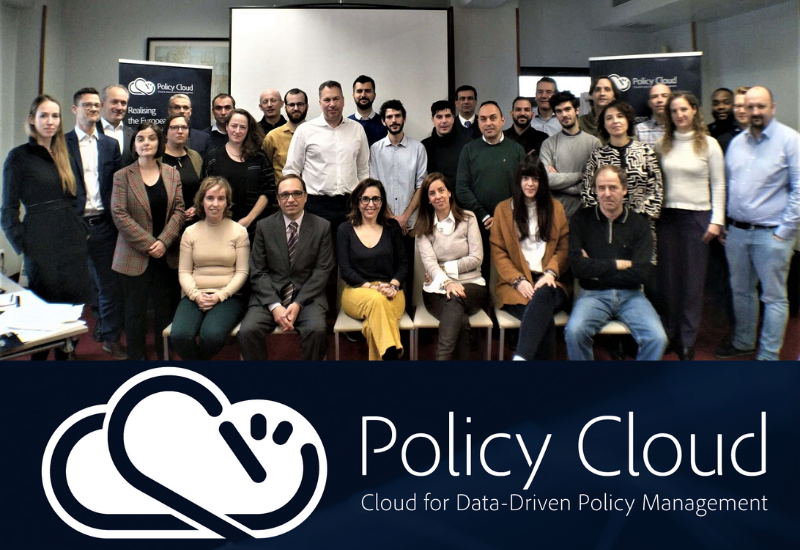
- Cloud for Data-Driven Policy Management
- Contact Us
- Join our community
- Login
PolicyCloud to help make data-driven policy management a reality across Europe
Digitisation and big data are revolutionising the way we live, think and make decisions. With the constant proliferation of devices and networks, more and more of the data being created from a variety of sources is able to be stored, transmitted and processed efficiently in large amounts. Increasingly, cloud environments, big data and other innovative data-driven approaches are enabling policy makers to deliver evidence-based policies which impact economic growth and contribute to modernising the public sector and improving the lives of citizens across Europe.
However, new technologies and big data also bring new challenges. With so much data now available to policymakers, the search is on for ways to effectively access, make sense of, and use data to model, create and implement policy succesfully.
Policy Cloud is a brand-new project that will address these challenges by becoming the first pilot using the European cloud infrastructure for public administrations. Funded under the European Commission’s H2020 programme, and over the next 3 years the project will deliver a unique integrated environment addressing the full lifecycle of policy management. The project will use the capabilities offered by the European Cloud Initiative, especially concerning data analysis, in order to facilitate evidence-based policy making.
Led by ATOS Spain, the 14-partner-strong consortium from across Europe covers a diverse range of organisations, including large companies and cloud providers, SMEs, research centres and policy makers. They will provide Policy Cloud with the perfect mix of skills for approaching its long-term mission towards policy co-creation and cross-sector optimisation.
During the project kick-off meeting in Madrid last week, project coordinator Ricard Munné, (ATOS Spain) commented, “The mix of technical expertise and the pilot cases will demonstrate how new technologies can be harnessed for trusted, data-driven policy making.”
Providing technologies for data fusion, aggregation, interoperability
Said Dimosthenis Kyriazis, (University of Piraeus Research Center) "Policy Cloud will provide technologies for data fusion and aggregation, and also to make data interoperable. One of the key innovations is the Policy Development Toolkit, and in particular the way in which we will be able to run different analytics on different datasets. Providing analytics as a service will raise the level of abstraction, allowing policy makers to collect insights and compile policies without having to get into technical details."
Klaus Brisch (DWF) highlighted the significant ethical challenge inherent in bridging the technology that enables the collection and analysis oflarge amounts of data with the decision-making process. “We have to make sure that the services and products we develop in Policy Cloud are going to be compliant with the legal regulation,” he stated, adding, “especially when it comes to data protection, privacy, or cybersecurity. Eventually, future recommendations coming from Policy Cloud might also inspire changes in regulations."
Four Pilot Use Cases
Policy Cloud will run four pilot cases in different fields which will serve as demonstrators for data-driven policy management and leverage methodologies for user participation from citizens and communities. The results will be evaluated in heterogeneous environments and settings, demonstrating the applicability and re-usability of the developed models and tools in different countries, contexts and sectors.
The first use case Policies against radicalisation will focus on collecting and analysing data from social media and message boards, in order to provide policy makers with effective data-driven tools for addressing the issue of radicalisation.
The second use case Intelligent policies for the food value chain will exploit the Policy Cloud platform as a support tool to facilitate collaborative decision making for the various actors in the agrifood value chain in Aragon, Spain.
The Municipality of Sofia is the focus of the third use case, Urban policy making through analysis of crowdsourced data, which will seek to improve urban environments by crowdsourcing data analysis, specifically via an interactive map of the city on which citizens can signal issues to the administration in real-time.
Use case four, Open Data Policies for Citizens, will build upon the work initiated in London on predictive analysis to identify unemployment risk.
Policy Cloud and the EOSC
The final solutions and tools developed by PolicyCloud will eventually become available as public cloud services, contributing to the development of the European Open Science Cloud (EOSC), a core element in the European Commission's vision of making Europe a global leader in data management. This concept was clearly explained by EC President von der Leyen at the 50th annual meeting of the World Economic Forum in Davos.
Further details and updates about the evolution of Policy Cloud will be disseminated through the official website, as well as via the Policy Cloud Twitter and LinkedIn channels and a regular newsletter.


